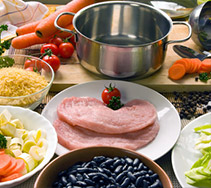Daily Caloric Intake and Basil Metabolic Rate
Click here to determine approximately how many calories your body needs at rest in order to sustain your current condition (i.e. weight, body fat%, fat weight). Remember, this is your body at rest. You then must add on additional calories for physical activity. Please read further to determine your approximate total caloric intake per day.
Gaining weight and losing weight is a very simple formula. When caloric intake exceeds caloric expenditure you will gain weight. When caloric expenditure is greater than caloric intake, you will lose weight. Thus, you must know how many calories (kcal) are in a gram of protein, carbohydrate, and fat. You should also know approximately how many calories you should consume and expend in a day. 
Simply put, you must burn off more calories than what you consume in any given day in order to lose weight. Knowing how many calories you are consuming every day is going to be an important part of losing weight. Therefore, you should know how many calories are in the nutrients you consume.
- Protein – one gram equals 4 kcal
- Carbohydrate – one gram equals 4 kcal
- Fat – one gram equals 9 kcal
- Alcohol – one gram equals 7 kcal
To find out approximately how many calories you are consuming in a day is easy. There are apps available for smart phones and tablets such as lose it and fitness pal. These apps can help you to stay focused on your eating habits and keep you aware of the amount of calories you’ve been consuming. If you don’t have access to apps, then you can keep track of your caloric intake by writing down the foods you consumed in a daily food journal. Be sure to write down all foods, portion size, and liquids. You must do this for one full week. We then can compare your average daily caloric intake to your approximate Basil Metabolic Rate (BMR).
Your BMR measures the amount of energy expended at rest and usually represents about 70% of an individual’s total daily energy expenditure. Additional calories are then added on to one’s BMR based on physical activity level. Depending on whether the person is sedentary or very active, 400 to 800 kcal may be added. For example, if you have a job that requires you to sit at a desk all day and you don’t workout regularly, then you should add 400 calories on to your BMR. So, if your BMR equals 1,200 calories then add 400 calories to that number. This equals 1,600 cal/day to sustain your current weight and body fat. Remember, your BMR tells us how many calories your body needs in order to sustain your current condition (i.e. body weight, % body fat, muscle tissue) at rest. Now, if you are trying to lose weight you should try to decrease your daily caloric intake by 500 cal/day. This can be done by decreasing food intake, exercising more, or the combination of the two. Try to burn or reduce 3,500 calories in one week. That is equivalent to 500 calories a day. This will help you to lose 1 lb in one week (3,500 calories equals one pound of fat).
Basil Metabolic Rate is influenced by several factors. One’s BMR is primarily effected by body size (height and weight). If two people, one weighing 100 lbs and the other weighing 130 lbs, jog one mile together, the heavier person will expend more energy and burn more calories. Other important factors that effect one’s BMR include age and sex. BMR decreases with age and is highest in a growing child. Men have a higher BMR than women due to the fact that males are generally larger than females. Other factors related to BMR include diet, heredity, and hormones.






